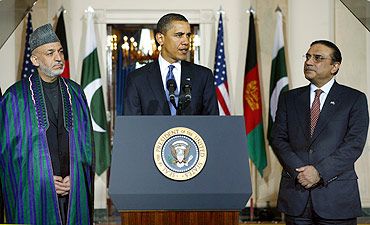'The real purpose of President Obama writing to President Zardari,' Husain Haqqani tells Rediff.com's Aziz Haniffa, 'was to seek a turnaround on terrorism -- that Pakistan, whatever its grievances, cannot have jihadi groups operating openly on its soil.'

Husain Haqqani, Pakistan's former ambassador to the United States, denies saying that President Barack Obama had offered to nudge India on Kashmir in a secret letter written to then Pakistan president Asif Ali Zardari.
In his book Magnificent Delusions: Pakistan, the United States, and an Epic History of Misunderstanding, Haqqani writes that soon after then US secretary of state Hillary Clinton's visit to Pakistan, then US national security advisor, retired General James Jones 'brought a letter from Obama to Zardari, offering that Pakistan and the United States become "long-term strategic partners".'
The letter laid out elements of the 'grand bargain' that US Vice-President Joe Biden had spoken of a few days before Obama's presidential term began.
'The letter hinted at addressing Pakistan's oft-stated desire for a settlement of the Kashmir dispute,' Haqqani writes. 'Obama wrote that the United States would tell countries of the region that "the old way of doing business are no longer acceptable".'
Haqqani writes that the letter acknowledged that 'Some countries -- a reference to India -- had used "unresolved disputes to leave open bilateral wounds for years or decades," while in an allusion to Pakistan, he (Obama) said, "Some countries have turned to proxy groups to do their fighting instead of choosing a path of peace and security. The tolerance or support of such proxies cannot continue".'
He says the US president in the secret memo claimed he was committed to working with the Zardari government 'to ensure the security of the Pakistani State and to address threats to your security in a constructive way,' and asked for cooperation in 'defeating Al Qaeda, Tehrik-e-Taliban Pakistan, Lashkar-e-Tayiba, the Haqqani network, the Afghan Taliban and the assorted other militant groups that threaten security.'
Haqqani also mentions in the book that 'Obama then wrote of his "vision for South Asia".' This involved 'new patterns of cooperation between and among India, Afghanistan and Pakistan to counter those who seek to create permanent tension and conflict on the subcontinent.'
Haqqani says his interpretation of Obama's letter was that 'it presented an opportunity for Pakistan to overcome past misgivings and build a real alliance with the United States.'
'Since the 1950s,' Haqqani wrotes, 'Pakistan had wanted an American role in South Asia. Now it was being offered one. In the end Pakistan would have to negotiate the Kashmir issue directly with India. But at least now the American president was saying that he would nudge the Indians toward those negotiations.'
Haqqani tells Rediff.com, "The book does not say that President Obama offered to nudge India on Kashmir," as a quid pro quo for Pakistan reining in the Lashkar-e-Tayiba and other anti-India terrorist groups.
"The book actually just quotes from what President Obama wrote and it was actually some Indian reporters who chose to hype up this element and this letter between two heads of State to make it about Kashmir," Haqqani said.
"It wasn't about Kashmir. It was about a strategic turnaround. It was about encouraging Pakistan to join a grand bargain in which its concerns will not be ignored, but it will have to give up terrorism."
"In fact, when the Indian media reported that, I issued a statement explaining that my book doesn't say what the news reports are saying. People first floated news reports, then they criticise it without reading the book. When you read the book, it is a very straight account."
"What I did say was that Pakistan always felt that in its bilateral talks with India, it was always at a disadvantage being the relatively smaller and weaker nation, so it had always wanted that the agenda of these talks should include issues of its interests, and Obama by saying that he will not let the old ways persist was in effect saying that although Pakistan and India have to solve their problems bilaterally, America will try to nudge India into not rejecting Pakistan's desire for talks on certain issues."
"How is that saying that Obama was going to nudge India into giving up Kashmir or any such thing? It is just that the America will make sure that both sides are considerate of each other concerns, which is something very normal and natural in international policy and they have been saying that all along."
"The real purpose of President Obama writing to President Zardari," Haqqani added, "was to seek a turnaround on terrorism -- that Pakistan, whatever its grievances, cannot have jihadi groups operating openly on its soil."
Image: US President Barack Obama with Afghan President Hamid Karzai and then Pakistan president Asif Ali Zardari. Photograph: Kevin Lamarque/Reuters










 © 2025
© 2025